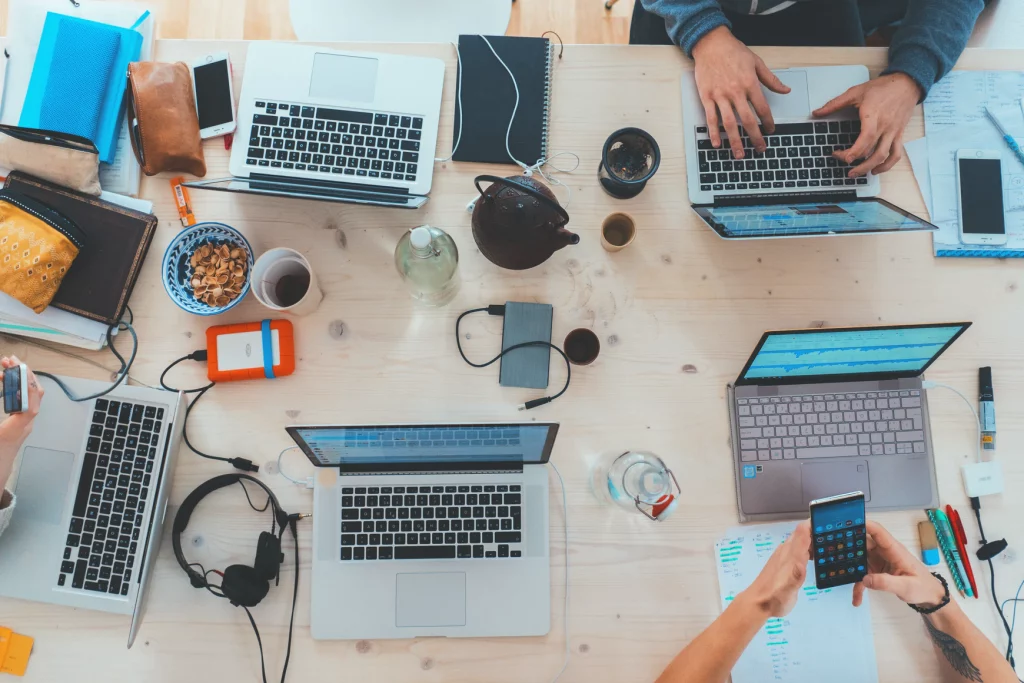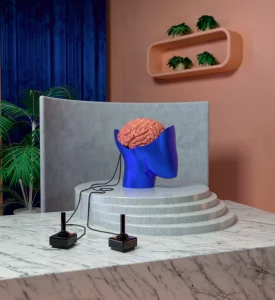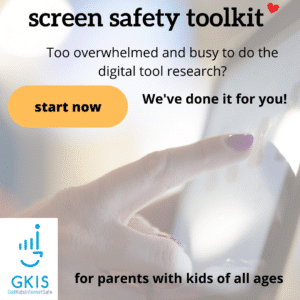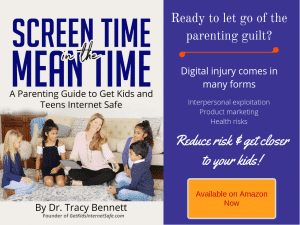Do you find yourself wasting precious time and energy on your screen devices? Does consuming digital content distract you from connecting deeply with yourself, others, and nature? If so, you are not alone. The average American spends 5 hours a day on smartphones, and 61% admit to being addicted to the internet and their devices.[1] When researching this article, I was shocked to find that I may be an internet addict! So, I challenged myself to a week-long digital detox to better understand the benefits of managing time, forming deeper connections, and seeking fulfilling triggers for natural dopamine. If you’re hooked too, check out Dr. Bennett’s book, Screen Time in the Mean Time. She covers why our screens are so compelling and creative ways to break the spell. Screen Time in the Mean Time is particularly critical for parents to assess the impacts that screen use has on their kids.
Digital Dopamine
The happiness we experience from eating ice cream on a hot summer day is similar to the happiness we experience from receiving notifications from our digital devices. Dopamine is responsible for that happiness. Dopamine is the feel-good chemical produced by our brain’s pleasure center that plays a starring role in motivation, desire, and behavior.[2] Dopamine gets released when we experience joy – like taking a bite of delicious food, having sex, exercising, or having fun talking to a friend. In an evolutionary context, dopamine rewards us for doing beneficial behaviors and motivates us to repeat them.[2]
Once dopamine is released, our brain craves more of the same or similar sources of stimuli. Smartphones provide a virtually unlimited supply of social stimuli, positive and negative. Every notification, whether it’s a text message or a “like” on Instagram or Facebook, has the potential for gushing dopamine.[2] However, most of us agree that digital dopamine feels more artificial than the dopamine released during real-life magical moments. If we restrict addictive digital habits that lead to dopamine dependency, we’ll train our brains to be at peace and content without distraction for longer durations. Contentment without distraction leads to less stress overall and more productivity.
What is a digital detox?
The Oxford Dictionary defines digital detox as, “A period of time during which a person refrains from using electronic devices such as smartphones or computers, regarded as an opportunity to reduce stress or focus on social interaction in the physical world.”[3]
According to Psychology Today, a digital detox does not always mean complete abstinence. Many people use their digital devices for essential business, educational, and familial purposes.[4]
Do you need to do a digital detox?
Do you …
- feel anxious or stressed if you can’t find your phone?
- feel compelled to check your phone every few minutes?
- feel depressed, anxious, or angry after spending time on social media?
- get preoccupied with the like, comment, or reshare counts on your social media posts?
- feel afraid that you’ll miss something if you don’t keep checking your device?
- often find yourself staying up late or getting up early to play on your phone?
- have trouble concentrating on one thing without having to check your phone?
- experience a low self-image due to comparing yourself to others online?
- not spend enough time moving around or engaging in exercising or mind/body-related activities?
- watch screens while eating meals, resulting in disoriented eating patterns which can lead to weight gain or restrictive eating habits.?[5]
If several of these issues apply to you, consider challenging yourself to a detox!
My Digital Detox Experience
On day one of my digital detox, I felt uncomfortable, yet relieved, from my sense of detachment. I knew I was missing out on online conversations, content, news, and media. But I didn’t mind because I was spending time on outlets that drew me closer to my life instead. My attention and focus improved. I also noticed instant behavior, mood, and energy enhancements. I felt more productive, efficient, and happily regulated.
My quality of sleep also improved significantly! Before my detox, I was on my phone late at night or first thing in the morning due to an influx of demanding notifications. That often tanked my mood moment one. Once detoxed though, I didn’t feel the need to check on what other people were doing because I was entirely focused on what I was doing. I also felt more self-confident because I wasn’t comparing myself to everybody else’s perfect selfies, relationships, and amazing vacations.
Don’t get me wrong, I was tempted! Especially in those boring moments. But after a while, I learned to happily pick up a book, go for a walk, make home-cooked meals, play with my dogs, or journal. These activities released natural and rewarding dopamine throughout my mind, body, and soul.
Overall, after my week-long digital detox, I preferred to stay disconnected. Now two weeks later, I feel more focused, connected, healthy, and happy! I feel empowered having broken that dependence on instant gratification, media engagements, and feedback.
The Benefits of a Digital Detox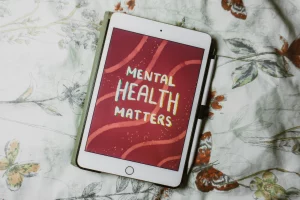
- Engaging in hobbies that release yummy dopamine in the brain
- More time to get things done
- Happy and steadied mood
- Self-focused rather than the compare and despair of social media
- Better eating, sleeping, and thinking patterns
How To Get Started
Pay attention to your emotions when you use your phone.
- Schedule breaks from phone
- Use apps to track usage
- Disconnect at night before bed to wind down
- Turn off notifications or put them on a later home screen on your phone
- Time spent online– individuals who aim to abstain from digital devices during certain times of the day, or even certain days of the week can schedule a digital curfew. For example, no usage after 9 PM, or no usage on Sundays. Such strategies are helpful for ensuring productivity during the day and better sleep and rest at night.
- Digital-free Spaces- Some British pubs have enacted a ‘no phones, no laptops, no tablets’ policy to encourage social conversation. Similarly, some people have started specifying digital-free spaces in their own homes. This commonly includes spaces such as the bedroom or the dinner table.
- Alternatives. Many people are using social media and digital devices to fill a social void. A successful digital detox will create free time for alternative activities, which may better fill this void. Individuals can create an action plan in this regard, which may include rekindling old interests, pursuing new hobbies, or volunteering for a sense of fulfillment.
GKIS Courses Can Help
- Our Screen Safety Essential Course gives you access to the tools and resources that you need to safely navigate today’s world. Our Essentials Course grants you instant access to useful videos, workshops, articles, and more.
- Screen Time in the Mean Time is the parenting guide needed in this digital age. Dr. B’s book provides tangible ways to keep your family safe and connected while utilizing technology.
- Our GKIS Social Media Readiness Course allows teens an opportunity to start taking accountability for their actions online and become proactive instead of reactive.
- Our GKIS Screen Safety Toolkit is a resource guide perfect for those that need smart tech tools for filtering, monitoring, and management plus some time to find workarounds.
Thanks to CSUCI intern Haley Begun for researching and co-authoring this article about the signs and benefits of a needed digital detox!
I’m the mom psychologist who will help you GetKidsInternetSafe.
Onward to More Awesome Parenting,
Tracy S. Bennett, Ph.D.
Mom, Clinical Psychologist, CSUCI Adjunct Faculty
GetKidsInternetSafe.com
Works Cited
Brown, Eileen. “Americans Spend Far More Time on Their Smartphones than They Think.” ZDNet, ZDNet, 28 Apr. 2019, https://www.zdnet.com/article/americans-spend-far-more-time-on-their-smartphones-than-they-think/.
Stephen Hartley, et al. “Dopamine, Smartphones & You: A Battle for Your Time.” Science in the News, 4 Feb. 2021, https://sitn.hms.harvard.edu/flash/2018/dopamine-smartphones-battle-time/.
“Digital Detox: Meaning & Definition for UK English.” Lexico Dictionaries | English, Lexico Dictionaries, https://www.lexico.com/definition/digital_detox.
Social Media and Mental Health: Time for a Digital Detox … https://www.psychologytoday.com/us/blog/talking-about-men/202002/social-media-and-mental-health-time-digital-detox.
Cherry, Kendra. “The Benefits of Doing a Digital Detox.” Verywell Mind, Verywell Mind, 20 Nov. 2020, https://www.verywellmind.com/why-and-how-to-do-a-digital-detox-4771321.
Photo Credits
Photo by Mo, https://unsplash.com/photos/NKhckz9B78c
Photo by Marvin Meyer, https://unsplash.com/photos/SYTO3xs06fU
Photo by Carl Heyerdahl, https://unsplash.com/photos/KE0nC8-58MQ
Photo by Emily Underworld, https://unsplash.com/photos/Ko3EMBFggok

